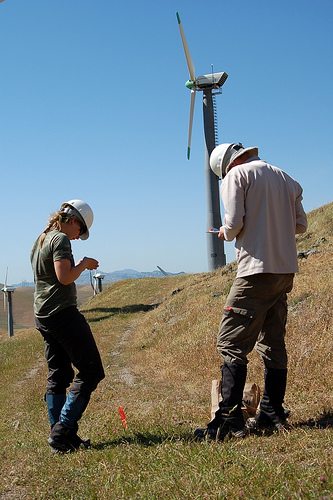Speak out to protect Altamont raptors
By Mike Lynes
The Altamont Pass is a problem for birds that just won’t go away. So that makes it a problem for Audubon too – a problem that will come to a head next Tuesday March 24.
While significant progress has been made in reducing bird deaths in the Altamont Pass, one company, Altamont Winds, Inc. (AWI), is trying to extend its current permits to run some of the most dangerous, old-generation turbines for another three years until 2018. If approved, the project would kill approximately 1,900 birds, including 280 to 400 raptors and at least 11 to 16 Golden Eagles, 82 to 139 Burrowing Owls, 86 to 96 American Kestrels, and 55 to 87 Red-tailed Hawks.
Not surprisingly, the proposal is opposed by Audubon, Save Mount Diablo, the Bay Chapter of the Sierra Club, the East Bay Regional Park District, the U.S. Fish & Wildlife Service, and the office of the California Attorney General. The project was initially rejected by the East County Board of Zoning Adjustments (EBZA) in February, but AWI appealed. The Alameda Board of Supervisors is scheduled to hear the issue on March 24, and seems poised to overturn the EBZA and approve the project.
AWI’s efforts to continue profiting from its old-generation turbines not only pose an unnecessarily high risk to birds, but they violate what has been Alameda County’s stated wind policy since at least 2005. At that time, the County and several wind companies settled litigation brought by five Audubon chapters – Golden Gate Bird Alliance, Santa Clara Valley Audubon, Marin Audubon, Ohlone Audubon, and Mt. Diablo Audubon—together with Californians for Renewable Energy (CaRE) and agreed to reduce bird deaths by 50 percent and expeditiously remove the most dangerous, old-generation turbines in the Altamont.


Removal of older turbines is one of the key strategies for making the Altamont Pass a productive site for renewable energy that does not unduly harm local bird populations. For decades, the old-generation turbines killed thousands of birds each year without mitigation. In the early 2000s, it became clear that to keep wind energy in the Altamont, the old turbines would need to be replaced with newer, safer turbines that were sited to minimize risk to birds, a process called “repowering.”
Every wind company in the Altamont Pass has made significant strides toward repowering except AWI.
Notably, AWI, the second-largest wind operator in Alameda County walked away from settlement talks with Audubon in 2005. Since that time, it has consistently refused to cooperate in trying to make the Altamont safer for birds. Now it wants a three-year extension on its permits to continue profiting while killing more birds.
AWI claims that it is working on a repowering project now and that it needs the three years of additional revenue to be successful. But AWI has talked about repowering since at least 2006 without making substantial progress. AWI’s actions now, just when its permits are set to expire, are too little, too late.
This isn’t the first time that AWI sought preferential treatment from the county. After it abandoned settlement discussions in 2005, AWI cut its own deal with Alameda County for less burdensome terms than the settlement required of other wind companies. Then in 2013, AWI requested and was granted a modification to its permits, which allowed it to continue operating over 820 old-generation turbines in the Altamont Pass on the condition that it would shut down completely by the end of 2015.
If AWI’s request is approved, it will have new permit terms that are more lax than its current permits and even more lax than its permit terms from 2005. It would represent a major step backward for the Altamont Pass and for birds in Alameda County.
AWI is trying to claim that this is a “jobs” issue, and that shutting down outmoded turbines will cost jobs. This is a complete red herring. Repowering will bring more jobs to the county – jobs removing old deadly turbines and installing new safer ones. Even if AWI cannot afford to repower in 2016, some other, more responsible company will step into the gap: California is a strong and growing strong market for wind power, and Altamont remains one of the prime locations for wind generation.
Audubon understands that renewable energy like wind power is key to addressing climate change, one of the biggest threats today to birds and other wildlife. We support renewable energy projects that are well-sited and fully mitigated. We’ve worked together with Alameda County and other wind companies for more than a decade to make the Altamont Pass safer for birds while promoting responsible renewable energy development.
Alameda County should keep the Altamont Pass wind program moving forward by rejecting AWI’s requested extension.
————————————
We need you to help persuade the Alameda County Supervisors to do the right thing for birds and for wind power!
Come to the Board of Supervisors hearing on Tuesday, March 24 at 11 a.m. and speak out for birds. The hearing will be at the Board Chambers, 1221 Oak Street, 5th floor, Oakland (near Lake Merritt BART).
If you cannot attend the hearing, please contact the Board of Supervisors. If you live in their district, be sure to let them know. (If you’re an Alameda County resident, click here to find out the name of your supervisor.) Telephone calls are better than emails, but any kind of respectful contact is helpful!
Alameda County Supervisor Contact Information
Supervisor Scott Haggerty Alameda County, District 1(510) 272-6691 Email link: http://www.acgov.org/form_app/feedback/feedback.jsp?id=BOSd1 Supervisor Richard Valle Alameda County, District 2 Phone: (510) 272-6692 Email link: http://www.acgov.org/form_app/feedback/feedback.jsp?id=BOSd2LDir Supervisor Wilma Chan Alameda County, District 3
Phone: (510) 272-6693 Email link: http://www.acgov.org/form_app/feedback/feedback.jsp?id=BOSd3 Supervisor Nate Miley
Phone: (510) 272-6694 Email link: http://www.acgov.org/form_app/feedback/feedback.jsp?id=BOSd4 Supervisor Keith Carson
Phone: (510) 272-6695 Email link: http://www.acgov.org/form_app/feedback/feedback.jsp?id=BOSd5
——————————————
Mike Lynes is Policy Director for Audubon California. Before that, he was Executive Director and Conservation Director for Golden Gate Bird Alliance, where he was involved in Altamont Pass wind issues for years.
